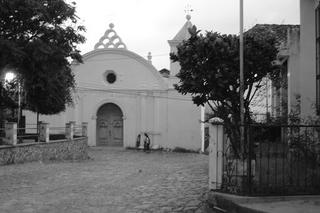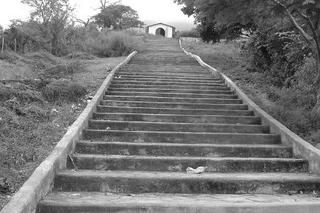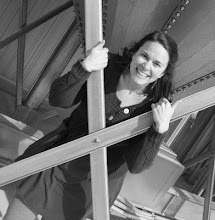Yuscarán
17 kilometers off the PanAmerican highway down a still and empty road is the town of Yuscarán, home of the aguardiente (sugar cane liquor) of the same name and home of Donkey Polo. My friend Colin and I waited for what seemed like an hour in the hot, early afternoon sun along this untravelled bit of road for a ride into the town. The roadside was covered with scrubby plants with green mountains in the distance and I let myself, for a moment, pretend I was in Africa, somewhere I have been dreaming about lately. Two pickups passed us. The first sped by, taunting us with an empty truck bed. The next truck stopped and filled up before it got to us, collecting a half dozen women with buckets and parcels. Finally, a logging truck stopped. We threw our backpacks on top of the logs and the driver made his cautious way along the crumbling mountain roads to Yuscarán.
Like all Honduran towns, Yuscarán is centered around a central park. Like all central parks, Yuscarán´s features a cathedral (see photo below), a
 fountain, and lots of curious locals sitting on the benches, staring at us with slightly amused looks in their eyes. Apparently, it is not every day that the logging truck passes through the narrow cobblestone streets and lets out 2 tall, sweaty gringos bearing enormous backpacks.
fountain, and lots of curious locals sitting on the benches, staring at us with slightly amused looks in their eyes. Apparently, it is not every day that the logging truck passes through the narrow cobblestone streets and lets out 2 tall, sweaty gringos bearing enormous backpacks.We knew of only 2 hotels. At one of them, no one answered the bell, the other had no electricity (but they kindly offered to a 30 lemp--about $1.50--discount and candles). Knowing how early dark comes (5:30 p.m.), we set out to find a hotel whose name we kept forgetting owned by someone named "Junior." We were given a point in the general direction. Everyone from whom we tried to extract more specific directions said the same thing, "go straight, go straight." Sometimes, they elaborated: "go straight and ask that man." Funny thing is, the roads in Yuscarán don´t go straight. They bend at unexpected angles, plummet down into unknown barrios, climb up toward ruined castles of buildings.
A man with a big belly and red eyes--possibly "that man" they kept telling us about--finally got us going straight down the right street. He and his pals gave us some kind of warning about our hotel in mumbled, regional Spanish which I did not completely understand. When I asked him what he meant, he made a reference to Halloween and how at our hotel "you go to sleep on one side of the bed and wake up on the other." All the men laughed and we laughed too, just to be polite.
One of the men, looking for a tip, insisted on showing us to the hotelito and banged on the door until we finally got the attention of the owners. Our room was clean and simple, filled completely by beds, and didn´t appear to be haunted, but still had luggage on the beds which meant we couldn´t check in until 5:30. Considering our other options, we told them it would do.
We walked past the stinky aguardiente factory, which looked more like an abandoned YMCA than a factory, through the cobblestoned streets onto the dirt roads at the edge of town in search of the famous lookout, beneath an immense Ceiba tree, high above Yuscarán. We climbed a set of stone stairs toward a small chapel (see photo below)
and
 the tree, sat ourselves down on the hill as the day began to fade. We watched children play and then get called home and for a few moments found ourselves alone looking over Yuscarán and the other tiny pueblos that dotted the mountainsides. When the clouds rolled in we hurried away, back into town to the only restaurant, a Chinese place attached to the electricity-less hotel. We sat down before the rain came and ordered anything that appealed to us from lemonade to wontons. We hadn´t since early that morning and it was almost 5 o´clock, but we still couldn´t finish all the food. After the meal, not having seen or heard a word about Donkey Polo, we ask one of the restaurant employees. We are disappointed to learn that Donkey Polo (yes, Polo played on donkeys instead of horses) is only played during the annual town fair. On our return to our hotel, we found the Yuscarán factory already closed, which meant if we wanted a souvenir bottle of the famous aguardiente, we would have to buy it ourselves.
the tree, sat ourselves down on the hill as the day began to fade. We watched children play and then get called home and for a few moments found ourselves alone looking over Yuscarán and the other tiny pueblos that dotted the mountainsides. When the clouds rolled in we hurried away, back into town to the only restaurant, a Chinese place attached to the electricity-less hotel. We sat down before the rain came and ordered anything that appealed to us from lemonade to wontons. We hadn´t since early that morning and it was almost 5 o´clock, but we still couldn´t finish all the food. After the meal, not having seen or heard a word about Donkey Polo, we ask one of the restaurant employees. We are disappointed to learn that Donkey Polo (yes, Polo played on donkeys instead of horses) is only played during the annual town fair. On our return to our hotel, we found the Yuscarán factory already closed, which meant if we wanted a souvenir bottle of the famous aguardiente, we would have to buy it ourselves.Tired from the travelling, hiking, and eating, we spent the evening watching the Discovery channel and, when we found ourselves yet again hungry, eating our leftovers. Around 4 in the morning, I awoke to find the television on, but muted. Faces flashed on the screen, silent and eerie. I wondered how long they had been watching me sleep. Thinking I had rolled over on the remote, I look for it and find it nowhere near me, but on one of the empty beds. We both swore we had left the TV on the Discovery Channel, unmuted, when we turned it off before falling asleep. Perhaps, our big-bellied friend had been right to warn us.
The next morning I went looking for breakfast and coffee. A cup of coffee was not to be found and I ended up with a plate of steamed rice and beans and fried plantains at a dim comedor that appeared to have been, at one time, a library. The walls were tall and lined with dark, vacant shelves. A political rally was blasting on the TV and a mangy dog sniffed my feet. Later, we rode out of Yuscarán in the back of a brand-new pick-up truck. The driver, like us, bound for Tegucigalpa, finally going, like they all said, in a straight line down the highway.


1 Comments:
Mmmmm.... Breakfast! [fried plantains, beans and a mangy dog = rock on]
+ Raj
Post a Comment
<< Home